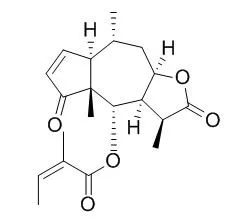| In vitro: |
| Phytother. Res., 1994, 8(8):436-8. | | Antiprotozoal activities of Centipeda minima.[Reference: WebLink] |
METHODS AND RESULTS:
In vitro activity against Giardia intestinalis was used for bioassay-guided fractionation of crude extracts from C. minima. The sesquiterpene lactone, Brevilin A was isolated and found to have antigiardial activity (IC50 = 16.1 μM) and was similarly active in vitro against Entamoeba histolytica (IC50 between 4.5 and 9 μM) and against Plasmodium falciparum (IC50 = 9.42 μM).
CONCLUSIONS:
Three flavonoids, quercetin, quercetin 3-methyl ether and kaempferol 7-glucosylrhamnoside were also isolated. | | PLoS One . 2013 May 21;8(5):e63697. | | Brevilin A, a novel natural product, inhibits janus kinase activity and blocks STAT3 signaling in cancer cells[Pubmed: 23704931] | | Abstract
Signal abnormalities in human cells usually cause unexpected consequences for individual health. We focus on these kinds of events involved in JAK-STAT signal pathways, especially the ones triggered by aberrant activated STAT3, an oncoprotein which participates in essential processes of cell survival, growth and proliferation in many types of tumors, as well as immune diseases. By establishing a STAT3 signal based high-throughput drug screening system in human lung cancer A549 cells, we have screened a library from natural products which contained purified compounds from medicinal herbs. One compound, named Brevilin A, exhibited both strong STAT3 signal inhibition and STAT3 signal dependent cell growth inhibition. Further investigations revealed that Brevilin A not only inhibits STAT3 signaling but also STAT1 signaling for cytokines induced phosphorylation of STAT3 and STAT1 as well as the expression of their target genes. In addition, we found Brevilin A could attenuate the JAKs activity by blocking the JAKs tyrosine kinase domain JH1. The levels of cytokine induced phosphorylation of STATs and other substrates were dramatically reduced by treatment of Brevilin A. The roles of Brevilin A targeting on JAKs activity indicate that Brevilin A may not only be used as a STAT3 inhibitor but also a compound blocking other JAK-STAT hyperactivation. Thus, these findings provided a strong impetus for the development of selective JAK-STAT inhibitors and therapeutic drugs in order to improve survival of patients with hyperactivated JAKs and STATs. | | Biomed Pharmacother . 2018 Feb;98:619-625. | | Brevilin A induces apoptosis and autophagy of colon adenocarcinoma cell CT26 via mitochondrial pathway and PI3K/AKT/mTOR inactivation[Pubmed: 29289836] | | Abstract
Brevilin A is a sesquiterpene lactone isolated from Centipeda minima and possesses inhibitory effects on proliferation of various tumor cells. In this study, Brevilin A inhibitory effect on proliferation and its molecular mechanism of action were investigated both in vivo and in vitro in colon adenocarcinoma CT26 cells. The results indicated that the inhibitory effect of Brevilin A in CT26 proliferation was dose-dependent and this effect was due to apoptosis. Furthermore, Brevilin A increased ROS levels, decreased mitochondrial membrane potential (MMP) and induced apoptosis of CT26 cell in a dose-dependent manner. Apoptosis induced by Brevilin A was higher than that induced by adriamycin under the same dose. Cleaved-caspase-8, cleaved-caspase-9 and cleaved-caspase-3 were up-regulated after Brevilin A treatment, together with an increase of Bax protein expression, while Bcl-2 was reduced. Further investigation revealed that Brevilin A inhibited the phosphorylation of PI3K, AKT and mTOR and promoted the expressions of autophagy-related proteins LC3-II, Beclin1 and Atg5 and consequent formation of autophagosomes, whereas 3-methyladenine (3-MA), a type III PI3K inhibitor, inhibited autophagosomes formation induced by Brevilin A. In vivo investigation suggested that Brevilin A significantly inhibited the growth of CT26 tumor compared to adriamycin and concurrently promoted the expressions of LC3-II and cleaved-caspase-3 in tumor tissues. Our results demonstrated that the anti-tumor activity of Brevilin A was mainly achieved by the induction of cell apoptosis and autophagy, suggesting a promising potential as antitumor drug against colon adenocarcinoma. |
|






 Cell. 2018 Jan 11;172(1-2):249-261.e12. doi: 10.1016/j.cell.2017.12.019.IF=36.216(2019)
Cell. 2018 Jan 11;172(1-2):249-261.e12. doi: 10.1016/j.cell.2017.12.019.IF=36.216(2019) Cell Metab. 2020 Mar 3;31(3):534-548.e5. doi: 10.1016/j.cmet.2020.01.002.IF=22.415(2019)
Cell Metab. 2020 Mar 3;31(3):534-548.e5. doi: 10.1016/j.cmet.2020.01.002.IF=22.415(2019) Mol Cell. 2017 Nov 16;68(4):673-685.e6. doi: 10.1016/j.molcel.2017.10.022.IF=14.548(2019)
Mol Cell. 2017 Nov 16;68(4):673-685.e6. doi: 10.1016/j.molcel.2017.10.022.IF=14.548(2019)